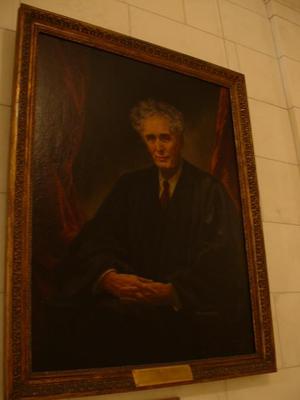Reason's panel discussion on bioethics: a view from the back rowWhat is humanity's most pressing concern? Terrorism? Nuclear proliferation? Natural disasters? Poverty? According to
Reason magazine's
Nick Gillespie, it's human enhancement--the promise of better, longer lives through technological wizardry, genetic modification, and designer drugs.
Tapping away at my trusty HP laptop, I recently listened to a
panel discussion moderated by Gillespie among Joel Garreau, Eric Cohen, and Ron Bailey on the hype and hope of our "post-human" future. The four exchanged witty barbs, gave short speeches, answered audience questions, and plugged their publications over free drinks in the lobby. Here are some notes and observations.
Ron BaileyBailey offered an unrelentingly upbeat, libertarian view of the future, described as a "more than realistic" scenario. He noted the early successes of efforts to extend life, further embryonic stem cell research, perfect genetic testing of infants, and genetically modify food to cure disease and increase production. His vision included five-generation family reunions and "a world that's greener and cleaner." Bailey was surprised by the confluence of opposing groups from both right and left that "abhor" these efforts. "They are against heaven," Bailey claimed, "because they wrongly fear that biotech will lead to hell." The dangers, not the benefits, are ill-defined and speculative, bugaboos invented to thwart progress.
Eric CohenCohen, following Bailey's prepared speech, immediately questioned such gee-whiz enthusiasm, noting that the choice of Bailey's title,
Liberation Biology, a play on
liberation theology, was apt, since it also comprises "interesting, silly, weird ideas." Cohen didn't propose any Luddite countermeasures to technological progress--"most biotech is great, I hope the stocks go up, they cure various diseases, etc."--but raised many skeptical questions about the means and ends of the voyage to technotopia. Means: Should we destroy human embryos to further research? Ends: "Can we write a better sonata than Mozart, a better play than Shakespeare? Can we really improve the family if we're 'designer attitude'-centered? If we thought we could live forever, would we have the same urgency of ambition?" Cohen's critique alluded to both Platonic conceptions of virtue and ancient fears of becoming "a lot more like gods." It did not seem particularly well-received by the audience--perhaps because Cohen offered so many questions and so few answers.
Joel GarreauThough he sat to the left of both Cohen and Bailey, Garreau tried to position himself somewhere in the middle. Neither "heaven" nor "hell" is the likely outcome of progress, Garreau explained. Ordinary people will adapt to the inward-facing technology of genetics, robotics, information, and nanomachines, and use them to build a better world. Garreau listed several recent advances, such as DARPA projects to send email using thoughts, memory drugs that would effectively "banish senior moments," There won't be one moment where we'll know the future has really arrived; "thousands of incremental changes," not epochal events, mark the way. The measure of progress is how many unpredictable humans can communicate and adapt to the changes. Garreau discussed the fourth plane that crashed over Pennsylvania on September 11, when cell phones and courage made the difference.
thoughtsThere was one gaping aporia in the discussion. Although Ron Bailey briefly mentioned the dangers of biopathogenic terrorism, the panel otherwise didn't talk about the political or cultural movements that might preclude or radically delay their versions of the future. Where
are all the flying cars? Why don't we all use Macintosh and Betamax? Whatever happened to
Flooz? The future is fickle.
All in all, the discussion was well worth the admission price: the cost of sitting through droning, dull questions-that-weren't-really-questions from the few audience members who tried to outshine the panelists. (None succeeded.) In fact, if I may indulge in a minor rant that's conditioned by my experience as a teacher, it's time for the standard panel discussion format to bow out to something more interactive. For example, questioners could type out their queries on laptop connected to a projector, and thus be forced to make sense and not just preach or stall or fumble. The moderator could choose especially pertinent questions to visit first. (Gillespie, by the way, did a fine job nonetheless.)
After the discussion ended, I asked three of the four participants which book or movie "got" the future the best. Ron Bailey demurred, claiming that "no one makes movies where the future turns out okay." Joel Garreau hinted that I should read his book, but when pressed said he liked
Blade Runner, though not because he thought it was accurate. Nick Gillespie said that technological progress is pretty much a given in futurism; Phillip K. Dick's books, though, offer the keenest insights into human responses to a new kind of nature. Eric Cohen disappeared before I got a chance to ask.
[note: I typed much of this while sitting as far away from the microphones as I could, so any transcription errors are my own.]
 It's a ceiling. It's aesthetically pleasing.
It's a ceiling. It's aesthetically pleasing.  This one caps the National Academy of Sciences.
This one caps the National Academy of Sciences. When you mistakenly buy fun-size sandwich bags, you have to make fun-size sandwiches.
When you mistakenly buy fun-size sandwich bags, you have to make fun-size sandwiches. Yes, that's fossil Xiphactinus making a meal of fossil Ananogmius.
Yes, that's fossil Xiphactinus making a meal of fossil Ananogmius. D.C. is chock full of jaw-dropping ceilings. Why?
D.C. is chock full of jaw-dropping ceilings. Why? Camden Yards is no Safeco Field, but it's got a lot more character.
Camden Yards is no Safeco Field, but it's got a lot more character. Josh, this is for you.
Josh, this is for you. The panda, the embassy, my wife: all cute.
The panda, the embassy, my wife: all cute. Because I had twenty minutes to spare in the Denver airport.
Because I had twenty minutes to spare in the Denver airport. Speaks for itself.
Speaks for itself. Groveton Cemetery, Manassas. 260 Confederate dead, only two marked graves.
Groveton Cemetery, Manassas. 260 Confederate dead, only two marked graves. The sinuous curves of the National Museum of the American Indian.
The sinuous curves of the National Museum of the American Indian.


